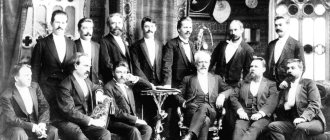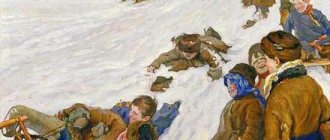October 15, 1814 – July 27, 1841 (26 years)
4.8
Average rating: 4.8
Total ratings received: 20248.
Mikhail Yuryevich Lermontov (1814–1841) is a great Russian poet and prose writer, as well as a talented artist and playwright, whose works had a huge influence on writers of the 19th–20th centuries. His work is known for a wide variety of themes and lyrical motifs. The poet made an invaluable contribution to the formation of the realistic novel of the 19th century.
The material was prepared jointly with a teacher of the highest category, Ilyina Galina Sergeevna.
Experience as a teacher of Russian language and literature - 36 years.
Childhood and education
Mikhail Lermontov was born on October 3 (15), 1814 in the family of an officer, and was raised by his grandmother. Lermontov spent almost his entire childhood with her in the Tarkhany estate in the Penza province.
He is being educated at home. A new stage begins in Lermontov’s biography: he studies at a university boarding school in Moscow (1828–1830). His first poems were written there.
Then Lermontov's life included studying at Moscow University (1830–1832). At this time, Lermontov was interested in the works of Friedrich Schiller, William Shakespeare and George Byron.
Mikhail Yuryevich spent the next two years after studying at the university at the School of Guards Ensigns in St. Petersburg.
Years of study
Upon returning from the Caucasus, Elizaveta Alekseevna hired teachers for Michel. The choice was extremely unfortunate. The Greek did not work with the boy at all, and the Frenchman failed to instill in the child a love of French. There was a large library on his grandmother’s estate, and Mikhail Yuryevich was engaged in self-education, reading everything. Along with French, he studied German and English, and read European authors in the original.
In 1829, Elizaveta Alekseevna took her grandson to Moscow to enter the university noble boarding school. Upon graduation, Mikhail Yuryevich entered Moscow University. But my studies in Moscow did not go well. At first, classes were not held due to quarantine due to cholera, then because of the so-called “Malovsky story,” when students rebelled. This was the first student revolt in Russia. Many memoirs have been preserved about him. This is what the famous democratic writer Alexander Ivanovich Herzen wrote.
Everyone understood that this rebellion could not end well. The initiators of the rebellion could end up being recruited as soldiers, despite the noble origin of most of them.
Lermontov wrote poems on this occasion, which were preserved in the album of his fellow student Nikolai Ivanovich Polivanov. Lermontov lived in the same apartment with this student in Moscow. Subsequently, they will go to study together at the Guards School of Junkers.
The university authorities also understood that they would not be patted on the back for this rebellion. Therefore, we decided not to wash dirty linen in public. Malov was quietly fired, the instigators of the riot were put in a punishment cell, and the participants, including Lermontov, were sent on “vacation.”
A year later, the quarrelsome student transferred to the verbal department, but even here he could not find a common language with the teachers. Lermontov was smart and well-read, but he openly floundered in the academic “lecture” material. He quarreled with rhetoric teachers P.V. Pobedonostsev, as well as heraldry and numismatics M.S. Gastev, and submitted his resignation. A failed student, Lermontov went to St. Petersburg, hoping to transfer to the capital's university. But here he was offered to enroll again as a first-year student. The prospect of being an “eternal student” did not inspire him. After a conversation with the selection committee, he wandered around St. Petersburg for a long time, and as history shows, it was then that he composed one of the best poetic works - the poem “Sail”. We all remember its opening lines:
The lonely sail is white in the fog of the blue sea!.. What is he looking for in a distant land? What did he throw in his native land?
Service and the beginning of a literary career
In 1834 he began serving in the hussar regiment in Tsarskoe Selo.
The poet’s popularity came with the release of the poem “The Death of a Poet” (1837), dedicated to the death of Alexander Pushkin. For this work, Lermontov was arrested and sent into exile. Thanks to the efforts of the grandmother and Vasily Zhukovsky, who was close to the emperor, the punishment was slightly mitigated. On his way to the Caucasus, Lermontov stopped in Moscow for a month. Then Lermontov’s work “Borodino” (1837) was written for the anniversary of the Battle of Borodino.
During his Caucasian exile, Lermontov's creativity only blossomed; In addition to literature, he also paints. Thanks to his grandmother’s petitions, he returns to St. Petersburg and is reinstated in service.
Hobbies and habits
Like many of his contemporaries, representatives of the aristocracy, the writer adored foreign languages. He devoted a lot of time to studying them, as a result of which Mikhail was fluent in four languages. He was also partial to music; in his free time, the great writer played piano, cello, violin and guitar. He was also attracted to painting and even needlework. His love for everything beautiful was formed under the influence of talented teachers, whom his parents hired to teach Mikhail Yuryevich when he was still a child.
The poet's work and the second link
Further creativity in the biography of Mikhail Lermontov is associated with the editorial office of the journal Otechestvennye zapiski.
For a duel with the son of the French ambassador E. Barant, the poet was again sent into exile to the Caucasus (1840), where he participated in hostilities.
Lermontov's lyrics express themes of alienation, loneliness, and attraction to eternity. Lermontov’s most famous works: “Sail” (1831), “Masquerade” (1835), “Boyarin Orsha” (1835–1836), “Mtsyri” (1839), “Borodino” (1837 .), “The Prisoner” (1837), “The Demon” (1839), “Hero of Our Time” (1838–1840) are included in the list of the main masterpieces of Russian literature.
“Lermontov’s legacy has become part of the flesh and blood of Russian literature,” - so briefly and precisely A.A. Blok defined the role of the great writer and his works in the history of literature.
Duel and death of the poet
Lermontov wanted to resign in order to quietly engage in literary work. There were many plans in my head. But he was stubbornly refused to resign. The authorities were afraid of the poet, and in the depths of their souls they dreamed that the rebellious mountaineers would shoot him.
Such a chance presented itself. It was not the mountaineers who killed the last romantic of Russian literature. During a party at the Verzilins' house in Pyatigorsk, Lermontov infuriated his colleague and friend Martynov with his ridicule, and he challenged him to a duel. By Martynov’s own admission, he shot almost without aiming. Lermontov, according to the testimony of his seconds, even raised the pistol up and fired into the air.
The poet was first buried at the Pyatigorsk cemetery. Then, grandmother Elizaveta Alekseevna spent a lot of effort so that she was allowed to transport her grandson to Tarkhany. Having received the emperor's highest permission, she immediately sent her people to Pyatigorsk. On April 21, 1842, the coffin with Lermontov’s ashes arrived at the family estate and was laid out for farewell, and two days later Lermontov was buried next to his mother and grandfather.
Interesting Facts
- The first and only edition of the poems during the poet's lifetime was published in 1840.
- Lermontov was not attractive to women, but he devoted many works to the theme of love. Once having met a young girl from a neighboring estate, Ekaterina Sushkova, Lermontov did not receive mutual sympathy. Because of this, he decides to take revenge on her and after a while falls in love with him and upsets her upcoming wedding. After which he “abandons” Sushkova and admits that he never loved her.
- Being a daring man, during his entire short life Lermontov was in a duel three times, and duels were avoided four times thanks to the common sense of those around him.
- At the last duel, everyone was confident that Lermontov’s opponent had missed, since he was known as a poor shooter who did not have sufficient experience in this matter. However, Martynov hit Mikhail Lermontov directly in the chest, which led to the death of the poet.
All the interesting facts from the life of Lermontov
We have prepared an interesting quest about the life of Mikhail Yuryevich
Pass the
Childhood in Tarkhany
The Lermontovs lived in Tarkhany, on the estate of Mikhail Yuryevich’s grandmother, Elizaveta Alekseevna. At first, the young people loved each other. But Maria Mikhailovna’s illness led to her husband losing interest in her. Quarrels began between the spouses.
But it was not the conflicts that remained in Michel’s childhood memory. He often remembered his mother’s song, which she sang while sitting at the piano and holding it on her lap. Little Misha was not three years old when his mother, Maria Mikhailovna, died. For a grandmother who lost her only daughter, Michel became the only meaning of life. She exerted all her power, all her influence, to leave Mishenka and Tarkhanakh, to prevent his father from taking him away.
Yuri Petrovich understood that he was unable to provide Michel with a comfortable existence, and resignedly retreated before the imperious Elizaveta Alekseevna.
Michel was a sickly child, so the grandmother kept a doctor on the estate who was obliged to deal only with the health of her grandson. And although the children of the courtyard peasants played with the barchuk and entertained him, Misha Lermontov lived in a world of his own invention.
Guards time
After school, Lermontov, as before, lived by his hobbies, but with reproaches from his conscience. He wrote about this to his girlfriend and tried not to let anyone know. People who knew Lermontov always considered him kind and loving. But for himself it seemed humiliating. He tried to look like a merciless tyrant, like women’s hearts. Lermontov took revenge. He remembered old grievances. After a while, he took revenge on Ekaterina Sushkova. So much so that she even upset her marriage with Lopukhin. He later showed surprise at what happened. And then he explained that he didn’t love her. Mikhail Lermontov was indifferent to the service. He was ill when he learned of Pushkin's death. Everyone told him their version of what happened.
You may also be interested in the article: An interesting book with an exciting plot
But only Lermontov’s doctor truthfully told him about the duel and death of the poet Alexander Pushkin. Lermontov was very upset by this event. He wrote the work "The Death of a Poet". This poem drew praise from Dantes. One of Lermontov’s relatives began to reproach him for this. Then the poet became angry and kicked out the guest. He wrote the last 16 lines... The result was a trial and arrest. Pushkin’s friends and grandmother, who had connections, stood up for Lermontov. After a while, Lermontov was transferred to the rank of ensign, as before, in the Caucasus. The poet was in exile. He received a lot of attention, as well as sympathy and hostility.
Childhood. Students
M. Yu. Lermontov was born on October 3 (15), 1814 in Moscow. His father Yuri Petrovich was an officer and came from an old, impoverished noble family. It is believed that among his ancestors was the Spanish Duke of Lerma, who once fled from Spain to Scotland. The poet's mother Maria Mikhailovna was a noble, wealthy noblewoman. She died early, and the little boy began to live with his grandmother, Elizaveta Alekseevna Arsenyeva, on her estate Tarkhany. Both father and grandmother loved Mikhail, but Elizaveta Alekseevna was prejudiced towards her son-in-law. Mikhail loved his family, and their quarrels upset him.
The grandmother doted on her grandson and invited him to the best doctors and teachers. The boy read English, German and French classics in the original, and composed plays for the home theater. Subsequently, Mikhail regretted that he had not heard Russian folk tales in childhood, since he believed that they were more poetic than French literature. In order for him to receive a good education, in the spring of 1827 Arsenyeva moved with him to Moscow. There Mikhail entered the Noble boarding school at the university, studying there until 1830. Then, from 1830 to 1832, he studied at Moscow University (first in the moral and political department, then in the verbal department).
Over the years of his studies, Lermontov wrote several poems and more than 60 poems, but did not publish them, because he understood that these were only student experiments. At this time, his passion for the works of Byron, Schiller and Shakespeare intensified. The romantic “southern poems” of Pushkin had a great influence on him.
In 1831, Lermontov met his roommate Varvara Lopukhina, and they fell in love. Varenka was a beautiful, smart, enthusiastic girl. The poet loved her until the end of his life. Varvara's family was against her marriage to Mikhail; she was married to the rich Bakhmetev, who was much older than her. The girl missed Lermontov and soon became seriously ill. Her husband was against any communication between her and Mikhail Yuryevich. Varvara was the prototype of Vera from the novel “A Hero of Our Time.”
Interesting facts about M. Yu. Lermontov
- The poet was interested in various predictions, fortune telling, and symbols;
- studied Azerbaijani language;
- was impudent, sarcastic, arrogant, vindictive and merciless to the weaknesses of others;
- participated in three duels;
- loved to upset upcoming marriages - he pretended to be in love with someone else's bride, showered her with gifts, poems, and then admitted to the prank;
- The retired cavalryman Martynov, who killed the poet in a duel, was an amateur marksman - before this duel he fired a pistol only 3 times.






